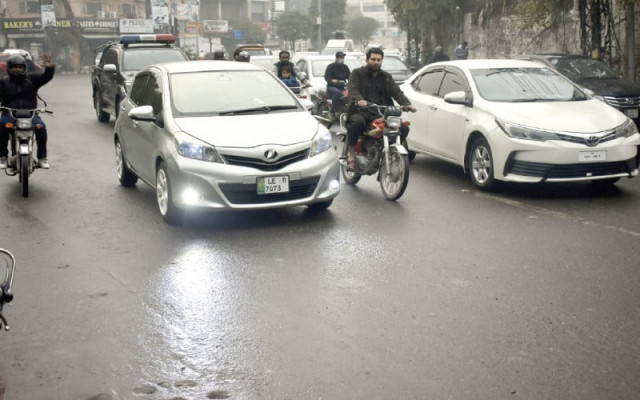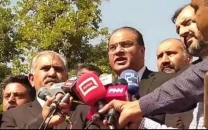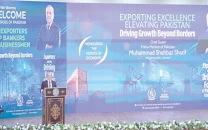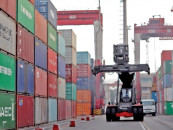Road encroachments continue to block traffic in Lahore
Experts claim random operations cannot curtail the violations, which require a comprehensive solution

With widespread unemployment forcing countless people out of the labor force, a large majority of low-income citizens have started setting up makeshift roadside carts and kiosks for running small businesses however, the resulting encroachments have created major hindrances on the roads for commuters, who can only dream of reaching their desired destination on time.
Despite the Metropolitan Corporation Lahore launching a series of anti-encroachment drives against violators across roads in the provincial capital, roadside encroachments including pushcarts, stalls, shops, platforms and parking stands of rickshaws continue to obstruct the flow of traffic throughout busy highways like the Grand Trunk (GT) Road, which do not have space for people to walk let alone for cars to move.
When the Express Tribune briefly spoke to a couple of encroachers sitting alongside the GT Road, the majority claimed that they regularly bribed the administration for allowing them to set up their pushcart.
“Mostly we pay Rs100 per day for operating our stall on the service line along the GT Road. However, after a series of crackdowns have been announced by the government, the colluders demand a bigger bribe” confessed an encroacher from Wagah Town, who further claimed that officials from the town staff, police, traffic police, Parks and Horticulture Authority and the Metropolitan Corporation Lahore, all collected bribes from pushcart owners from different areas.
Chief Traffic Officer (CTO) Lahore Amara Athar believed that encroachments were the biggest challenge for personnel tasked with maintaining the smooth flow of traffic. “We try our best to collaborate with the relevant institutions and remove as many encroachments as we can through our anti-encroachment drives,” maintained Amara.
However, Syeda Sani Zahra, a senior urban planner, begged to differ with Athar, since she was of the opinion that scattered crackdowns against encroachers could not offer a long-term solution to the persistent problem of encroachments.
Read:Road safety: Drive against underage driving launched
“Issues like encroachment would persist until or unless we have a comprehensive Town and Country Planning Act. As the population increases, encroachments in residential and commercial areas also increase. Town planning requires devisers to take into account details of the area, including population density, residential space and size of the commercial sector so that there is a separate area reserved for small businesses. Many countries throughout the world, including India, have similar laws. On the contrary, such legislation does not exist in Pakistan,” asserted Zahra.
Shedding light on a different aspect of the problem, Dr Salman Tariq, an environmentalist, highlighted the fact that incessant road encroachments led to traffic jams, which negatively impacted the air quality and noise levels in the city.
“Traffic jams usually take more than one hour to abate. When traffic slows down in an area, air pollution and noise levels naturally go up. If anyone observes the air quality index (AQI) of Lahore daily, areas with heavy traffic are usually more polluted,” emphasized Dr Tariq.
Read: Rise in Lahore traffic volume frustrates planners
Speaking to the Express Tribune on the matter, Umair Hussain Jafri, spokesperson of the Metropolitan Corporation Lahore said, “Removing all encroachments is a challenging task, but it is achievable. The campaign against temporary encroachments is still ongoing. Last year in December 1253 major encroachments were demolished across various parts of Lahore, while 1599 sheds and boards were taken down, 732 locations were sealed, 361 FIRs were filed, and 857 individuals were taken into custody. For Ramadan however, we have given leverage to rickshaw drivers that they are permitted to take rides along a designated section of the road.”



















COMMENTS
Comments are moderated and generally will be posted if they are on-topic and not abusive.
For more information, please see our Comments FAQ